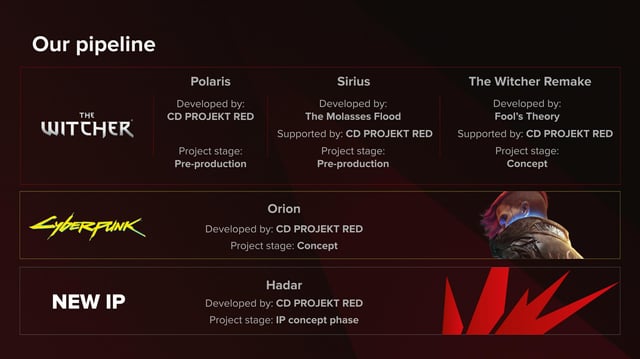CD Projekt Red's Risky Restructuring: A Veteran's Take on Diversification and the Road Ahead for Polaris, Orion, and Hadar CD Projekt Red (CDPR), a name synonymous with ambitious RPGs like The Witcher series and, more recently, the controversial Cyberpunk 2077, has announced a significant restructuring.

CD Projekt Red (CDPR), a name synonymous with ambitious RPGs like The Witcher series and, more recently, the controversial Cyberpunk 2077, has announced a significant restructuring. The company is splitting into three distinct internal studios: Polaris (focused on The Witcher 4, also known as Polaris), Orion (dedicated to the Cyberpunk 2077 sequel), and Hadar (tasked with developing a brand-new IP). As someone who’s weathered numerous boom and bust cycles in this industry, I’ve seen similar strategic shifts before, and the potential pitfalls and rewards are rarely straightforward. Is this a calculated move towards stability after the Cyberpunk 2077 debacle, or is CDPR spreading itself too thin? Let's delve into the strategic implications of this reorganization, analyzing the risks, potential impact on crunch culture, and how this impacts player expectations.
Diversification as Risk Mitigation: A Necessary Evolution?
The core argument for this restructuring revolves around risk management and diversification. The Cyberpunk 2077 launch was, to put it mildly, a disaster. The game was plagued with bugs, performance issues, and unmet promises, resulting in significant financial and reputational damage for CDPR. Investing so heavily in a single, large-scale project proved to be a critical vulnerability. Splitting into smaller, project-focused studios is a logical attempt to mitigate this risk.
Imagine a portfolio of investments. You wouldn't put all your money into one stock, would you? The same principle applies to game development. By having three separate teams working on different projects, CDPR reduces its reliance on any single title's success. If Hadar doesn't resonate with audiences, the impact on the company will be far less severe than if Cyberpunk 2077 had failed. This diversification offers a buffer, allowing CDPR to weather potential storms more effectively.
Smaller Teams, Healthier Culture? The Crunch Conundrum
One of the most persistent criticisms leveled against CDPR has been its history of crunch culture. Reports of grueling work hours and intense pressure on developers during the development of both The Witcher 3 and Cyberpunk 2077 are well-documented. Can this restructuring lead to a healthier work-life balance? The answer, unfortunately, isn't straightforward.
Smaller teams can foster a more collaborative and manageable environment, potentially reducing the need for excessive crunch. With more focused project scopes and dedicated leadership, it becomes easier to track progress, identify potential bottlenecks, and distribute workloads more evenly. However, the success of this restructuring hinges on a fundamental shift in CDPR's internal culture. Simply splitting into smaller studios won't magically eliminate crunch if the underlying pressures and expectations remain unchanged.

CDPR needs to actively promote a culture of sustainable development, prioritize employee well-being, and set realistic deadlines. This requires strong leadership, effective communication, and a willingness to push back against unrealistic expectations from investors and the gaming community. It also means investing in better project management tools and processes to ensure that teams are equipped to handle their workloads efficiently.
Lessons from the Past: Echoes of Vivendi, Activision, and EA
CDPR's restructuring isn't unprecedented. The gaming industry has a rich history of similar organizational shifts, with varying degrees of success.
- Vivendi/Activision Split: The fraught relationship between Vivendi and Activision, culminating in Activision Blizzard's independence, illustrates the dangers of stifling creative control and imposing unsustainable financial pressures. While the circumstances are different, CDPR needs to ensure that its new studios have the autonomy and resources they need to thrive.
- EA's Engine Shifts (Frostbite): EA's push to standardize development on the Frostbite engine, while intended to improve efficiency, often resulted in significant delays and challenges for studios accustomed to other technologies. CDPR must avoid imposing rigid frameworks that stifle creativity and hinder the unique development needs of each studio. Flexibility and adaptation are key.
- Historical internal reorganizations within large publishers: Many large publishers frequently adjust their studio structures, often to capitalize on specific genre trends or to better manage talent. The success of these maneuvers hinges on clear communication, strong leadership within each studio, and a willingness to adapt to changing market conditions.

The crucial takeaway from these examples is that restructuring alone is not a magic bullet. It requires careful planning, effective execution, and a genuine commitment to fostering a positive and productive work environment.
Independent Roadmaps or Shared Destiny?
A critical question is whether CDPR is truly moving towards more independent project roadmaps for each studio. While the creation of distinct entities suggests a greater degree of autonomy, the reality may be more nuanced. Will Polaris, Orion, and Hadar operate as completely independent units, or will they be subject to overarching corporate strategies and financial targets?
Ideally, each studio should have the freedom to define its own vision, set its own timelines, and manage its own resources. However, it's likely that CDPR will maintain a degree of centralized control, particularly in areas such as marketing, publishing, and technology. Finding the right balance between autonomy and oversight will be crucial for the success of this restructuring.

Managing Player Expectations: A Long Wait Ahead
Finally, we must consider the impact of this restructuring on player expectations. CDPR has built a loyal fanbase eager for the next installments in The Witcher and Cyberpunk universes, as well as the promise of a brand-new IP. However, the reality is that developing three major titles simultaneously will inevitably lead to longer development timelines for each.

CDPR needs to manage these expectations carefully. Over-promising and under-delivering, as happened with Cyberpunk 2077, is a recipe for disaster. Transparency and realistic communication are essential. The company should clearly communicate the development timelines for each project, avoid hyping up features that may not make it into the final game, and provide regular updates on progress. Gamers are more understanding of delays when they feel they are kept informed and that the development team is working diligently to deliver a quality product.
The Road Ahead: A Cautious Optimism
CD Projekt Red's restructuring is a bold move, driven by the need to mitigate risk and diversify its portfolio after the Cyberpunk 2077 launch. Whether it will ultimately succeed remains to be seen. The success hinges on several factors: fostering a healthier work culture, granting studios genuine autonomy, and managing player expectations effectively. While diversification spreads the risk, spreading the talent pool also needs to be considered. If CDPR can learn from the mistakes of the past and embrace a more sustainable approach to game development, this restructuring could pave the way for a brighter future. However, if it fails to address the underlying issues that led to the Cyberpunk 2077 debacle, it risks repeating the same mistakes, regardless of how many studios it creates. Only time will tell if this is a true turning point for CDPR, or just another chapter in the turbulent saga of the video game industry.
